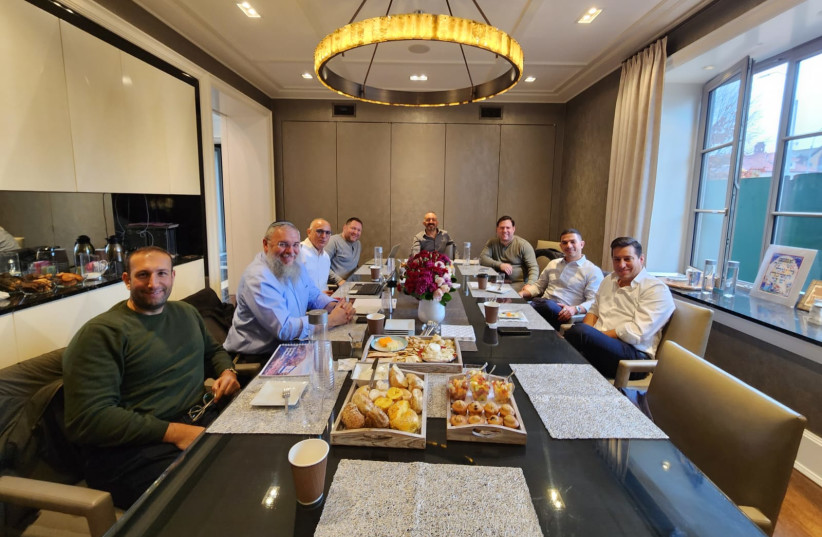Brooklyn businessman Rafi Lazerowitz’s love affair with Judea and Samaria began at his childhood dinner table as he listened to stories of his parent's friends, who were settling that biblical heartland by living in caravans on undeveloped hilltops.
So he knows firsthand the power a personal connection can play in building alliances. He wants to funnel that kind of informal alliance to help generate public grassroots support in the United States and Canada for the West Bank settlements.
This month, he is helping launch a national non-governmental group called American Friends of Judea and Samaria that would operate as an informal supportive arm in the United States of the Israeli settler leadership umbrella organization, known as the Yesha Council.
“We want to be an organization that educates the public Jewish and non-Jewish.”
Rafi Lazerowitz
“We want to be an organization that educates the public Jewish and non-Jewish,” said Lazerowitz, who will chair the new group.
It will include “anyone that supports Judea and Samaria or may not know they support Judea and Samaria until they actually get the facts of what is happening on the ground, without a political bias,” he explained in a telephone conversation with The Jerusalem Post from Brooklyn.

Advocating for and providing information about the West Bank settlements in the US
There are a number of fundraising organizations to support the physical development of the Jewish communities in that region, he said.
But there isn’t a group similarly dedicated, like this one will be, that will provide providing basic information about the region to connect those who support it under one digital and organizational roof, he explained.
The group, which will have a website, is set to launch this month just as the agenda of Israel’s new government, has sparked concerns about the impact of its politics on the American Jewish Diaspora community.
The timing, however, is coincidental, because Lazerowitz, who has already gathered around him a group of like-minded pro-Israel Americans, has been working on this project since 2018. The group made a pilot trip to the settlements last year. They have meet with former Yesha Council head David Elhayani and former Yesha Council CEO Yigal Dilmoni. The latter is on the group’s steering committee and actively worked with Lazerowitz, to formulate a plan for the group, whose launch was delayed by the COVID-19 pandemic.
The Yesha Council has long built connections with the United States as part of a major lobbying effort to generate support for the settlements among politicians on the federal and state level.
This is an apolitical group, explained Lazerowitz, adding that it is more interested in collecting friends than dollars, although there is a paid membership option with scaled levels.
“Our goal is to build membership with like-minded people who want to be part of something bigger,” Lazerowitz added.
Among their target groups will be young adults, so they can be informed either before they head to college or when they are in university, Lazerowitz said.
This includes Christian youth, which is influenced by the anti-Israeli sentiments they hear on college campuses, Dilmoni said.
One idea is to bring young adults, including Evangelicals, to learn about Judea and Samaria, he said.
Through the membership it is also to counter false reports about Judea and Samaria, by providing accurate information, he said.
Another idea has been to do a week of Judea and Samaria events in US locations such as New York, Dilmoni said.
Lazerowitz said that in the future, “we want to be the go-to organization for anything [connected to] Judea and Samaria. In 10 years if anyone wants to find out anything about Judea and Samaria, the go-to organization that everyone will talk about is American Friends of Judea and Samaria.
“If you are a student on campus and you have questions about how you can defend Judaea and Samaria to other people on your campus, comets American Friends of Judea and Samaria,” he said.
“If you are a student on campus and you have questions about how you can defend Judaea and Samaria to other people on your campus, comets American Friends of Judea and Samaria.”
Rafi Lazerowitz
This will gather “all like-minded people under one umbrella group, we want to be a voice for the people and the communities of Judea and Samaria, by gathering people that want to have a voice, that may not have the wherewithal or a family to be part of.
“We are that family for those people in America who want to feel as if they are part of family,” Lazerowitz said.
He started down this path, he said, because his mother had Israeli friends that lived in the Karnei Shomron settlement who would visit them in the US, he said.
“I would hear stories of how they first lived in caravans with their young kids I thought it was crazy, who would live in caravans and why,
“When I got a little bit older and I became a teenager in high school I started reading about the area that they lived in,” he said.
He spent time after high school in Karnei Shomron and in Judea and Samaria in general.
“I saw the determination of these people, their commitment, their determination, what their goals were... and what they gave up living under those conditions.
“It hit me that these people are keeping the land of our forefathers our biblical homeland not just for them but for us, for all the Jewish people around the world and we owe it to them and we owe it to ourselves to support them and to be in a voice for them,” Lazerowitz said.
